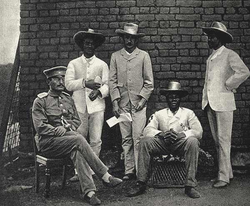
Samuel Maharero
Encyclopedia

Tribal chief
A tribal chief is the leader of a tribal society or chiefdom. Tribal societies with social stratification under a single leader emerged in the Neolithic period out of earlier tribal structures with little stratification, and they remained prevalent throughout the Iron Age.In the case of ...
of the Herero people in German South-West Africa
German South-West Africa
German South West Africa was a colony of Germany from 1884 until 1915, when it was taken over by South Africa and administered as South West Africa, finally becoming Namibia in 1990...
(today Namibia
Namibia
Namibia, officially the Republic of Namibia , is a country in southern Africa whose western border is the Atlantic Ocean. It shares land borders with Angola and Zambia to the north, Botswana to the east and South Africa to the south and east. It gained independence from South Africa on 21 March...
) during their revolts and in connection with the events surrounding the Herero genocide.
Life
Maharero was son to Kamaharero (or MahareroMaharero
Maharero was one of the most powerful paramount chiefs of the Herero people in South-West Africa, today's Namibia.-Biography:...
), an important Herero warrior and cattle raider. Samuel Maharero went to the local Lutheran schools, where he was seen as a potential priest. When his father died in 1890, he gained the chieftainship in the area of Okahandja
Okahandja
Okahandja is a town of 14,000 inhabitants in Otjozondjupa Region, central Namibia, and the district capital of the Okahandja electoral constituency. It is known as the Garden Town of Namibia. It is located 70km north of Windhoek on the B1 road...
, although he did not gain much of his father's wealth and cattle according to Herero inheritance customs. Initially, he maintained fairly good relations with the German colonial administration under Theodor Leutwein
Theodor Leutwein
Theodor Gotthilf Leutwein was colonial administrator of German Southwest Africa from 1894-1904. Born in Strümpfelbrunn in the Grand Duchy of Baden, he replaced Curt von François as commander of the Schutztruppe in 1894...
. However, increasing problems, involving attacks by German farmers, economic difficulties and pests, and the use of Herero land for railroads, diminished relations.
Maharero secretly planned a revolt with the other chiefs against the German presence. The initial attacks in the revolt, begun on January 12, 1904, were successful and involved the killings of several German farmer families. Leutwein was replaced as military leader by Lothar von Trotha
Lothar von Trotha
Adrian Dietrich Lothar von Trotha was a German military commander widely condemned for his conduct of the Herero Wars in South-West Africa, especially for the events that led to the near-extermination of the Herero....
, who brought 15,000 troops and created a bounty of 5,000 marks for the capture of Maharero. The Herero fighters were destroyed at the Battle of Waterberg
Battle of Waterberg
The Battle of Waterberg took place on August 11, 1904 in Waterberg, German South-West Africa , and was the decisive battle in the German campaign against the Herero.-The armies:...
on August 11, 1904 and the remaining ones were driven into the deserts of Omaheke
Omaheke
Omaheke is one of the thirteen regions of Namibia. Omaheke lies on the eastern border of Namibia and is the Western extension of the Kalahari desert. The name Omaheke is the Herero word for Sandveld. A large part of this region is known as the Sandveld...
.
Maharero succeeded to lead some of his people to the British
Great Britain
Great Britain or Britain is an island situated to the northwest of Continental Europe. It is the ninth largest island in the world, and the largest European island, as well as the largest of the British Isles...
Bechuanaland Protectorate (today Botswana
Botswana
Botswana, officially the Republic of Botswana , is a landlocked country located in Southern Africa. The citizens are referred to as "Batswana" . Formerly the British protectorate of Bechuanaland, Botswana adopted its new name after becoming independent within the Commonwealth on 30 September 1966...
). He remained leader of the exiled Herero, and became an important vassal of Sekgathôlê a Letsholathêbê, a chief in northern Bechuanaland. Samuel Maharero died there in 1923.
On August 23, 1923, his body was returned to Okahandja and was ceremoniously buried.
Today he is considered a great hero in Namibia
Namibia
Namibia, officially the Republic of Namibia , is a country in southern Africa whose western border is the Atlantic Ocean. It shares land borders with Angola and Zambia to the north, Botswana to the east and South Africa to the south and east. It gained independence from South Africa on 21 March...
and is celebrated on Herero Day
Heroes' Day (Namibia)
Heroes' Day is a national public holiday in Namibia. It is recognized by the United Nations as Namibia Day. Celebrated annually on 26 August, the day commemorates the Namibian War of Independence which began on 26 August 1966 at Omugulugwombashe....
on 26 August.

